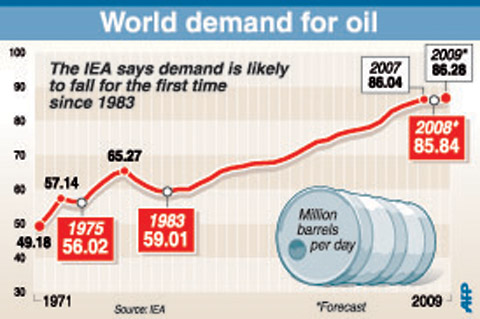Oil prices slid on Friday after the collapse of a US automakers bailout plan heightened worries about slowing demand as the global financial crisis bites.
Light sweet crude for delivery in January dropped US$1.70 a barrel to close at US$46.28 on the New York Mercantile Exchange.
On London’s InterContinental Exchange, Brent North Sea crude for January slipped US$0.98 to settle at US$46.41 a barrel.

AFP
Oil prices had soared more than 10 percent Thursday on signs that OPEC and Russia would cooperate next week in cutting production to support sagging prices.
“The beginning of a commodity rally that had included oil, may come to a halt as a consequence of the crisis of confidence in the wake of the bailout failure,” MF Global analyst John Kilduff said.
A US$14 billion plan to rescue ailing US automakers collapsed in the US Senate late on Thursday, raising the prospect of imminent bankruptcy for General Motors and Chrysler with millions of jobs at stake. The news weighed heavily on global stock markets on Friday, in turn depressing commodity prices.
“Crude futures tracked equity markets lower” on Friday, said Nimit Khamar, an analyst at Sucden brokers.
“Risk aversion set in after the auto industry bailout hit a snag,” Khamar said.
OPEC is widely expected to announce an output cut at a meeting on Wednesday in a bid to bolster prices that have plunged from record highs above US$147 in July.
OPEC, which pumps 40 percent of world crude, has called on non-members to play a role in reducing output to stem the sharp slide in crude prices of the last five months.
Russia said on Thursday it was ready to join forces with OPEC to stem the plunge in prices and could even become part of the oil cartel if membership were in Moscow’s interests.
Russia ranks alongside Saudi Arabia, de facto leader of OPEC, as the world’s largest oil exporter.
“The auto bailout failure will raise the specter of a deep recession as the ripple effect off the automakers supply chain spreads out. The paucity of credit may contract further as a consequence of the vast amount of debt issued by the car companies’ finance arms,” Kilduff said.
“The Treasury will be required to issue even more debt to cover the cost of the social fallout from expanded welfare, unemployment benefits, and pension guarantees,” he said.
Kilduff said Goldman Sachs oil analysts were issuing alarms months ago “super-spikes” to US$200 a barrel.
Those analysts “have now adopted the conclusion that we came to earlier this week: that the market was in a process of ‘bottoming,’” he said.

People can preregister to receive their NT$10,000 (US$325) cash distributed from the central government on Nov. 5 after President William Lai (賴清德) yesterday signed the Special Budget for Strengthening Economic, Social and National Security Resilience, the Executive Yuan told a news conference last night. The special budget, passed by the Legislative Yuan on Friday last week with a cash handout budget of NT$236 billion, was officially submitted to the Executive Yuan and the Presidential Office yesterday afternoon. People can register through the official Web site at https://10000.gov.tw to have the funds deposited into their bank accounts, withdraw the funds at automated teller

PEACE AND STABILITY: Maintaining the cross-strait ‘status quo’ has long been the government’s position, the Ministry of Foreign Affairs said Taiwan is committed to maintaining the cross-strait “status quo” and seeks no escalation of tensions, the Ministry of Foreign Affairs (MOFA) said yesterday, rebutting a Time magazine opinion piece that described President William Lai (賴清德) as a “reckless leader.” The article, titled “The US Must Beware of Taiwan’s Reckless Leader,” was written by Lyle Goldstein, director of the Asia Program at the Washington-based Defense Priorities think tank. Goldstein wrote that Taiwan is “the world’s most dangerous flashpoint” amid ongoing conflicts in the Middle East and Russia’s invasion of Ukraine. He said that the situation in the Taiwan Strait has become less stable

CONCESSION: A Shin Kong official said that the firm was ‘willing to contribute’ to the nation, as the move would enable Nvidia Crop to build its headquarters in Taiwan Shin Kong Life Insurance Co (新光人壽) yesterday said it would relinquish land-use rights, or known as surface rights, for two plots in Taipei’s Beitou District (北投), paving the way for Nvidia Corp to expand its office footprint in Taiwan. The insurer said it made the decision “in the interest of the nation’s greater good” and would not seek compensation from taxpayers for potential future losses, calling the move a gesture to resolve a months-long impasse among the insurer, the Taipei City Government and the US chip giant. “The decision was made on the condition that the Taipei City Government reimburses the related

FRESH LOOK: A committee would gather expert and public input on the themes and visual motifs that would appear on the notes, the central bank governor said The central bank has launched a comprehensive redesign of New Taiwan dollar banknotes to enhance anti-counterfeiting measures, improve accessibility and align the bills with global sustainability standards, Governor Yang Chin-long (楊金龍) told a meeting of the legislature’s Finance Committee yesterday. The overhaul would affect all five denominations — NT$100, NT$200, NT$500, NT$1,000 and NT$2,000 notes — but not coins, Yang said. It would be the first major update to the banknotes in 24 years, as the current series, introduced in 2001, has remained in circulation amid rapid advances in printing technology and security standards. “Updating the notes is essential to safeguard the integrity